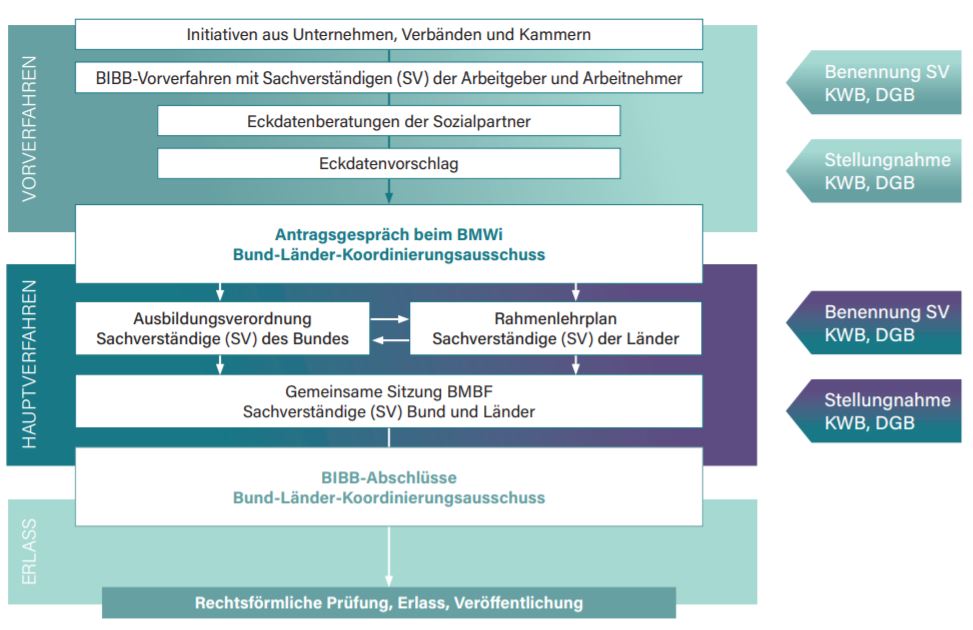From the modernisation of professions to new job profiles

©AdobeStock auremar
Education and training regulations create the framework for training skilled workers who are urgently needed by sectors and companies. Social partners as well as representatives from associations and companies are therefore continuously and numerously involved in the work on vocational regulations.
Professional order work is important for employers!
If sectors or companies determine that the requirements for the skills, abilities and competences to be taught in an occupational profile are changing, they initiate a "reorganisation procedure". This ensures that initial and continuing training regulations meet current requirements and are updated in line with practical needs. The creation of new occupations is also possible in this way, such as e-commerce clerks in 2018.
The coordination of the procedures is the responsibility of the Board of Trustees of German Industry for Vocational Education and Training (KWB) on the employer side and the German Trade Union Confederation (DGB) on the trade union side.
Professional order work creates modern professions for all companies in Germany!
The regulatory work ensures that training and further training contents correspond to the current needs of the practice and thus remain modern.
Training and further training regulations are always formulated in such a way that they are transferable to all companies (small, medium, large) and are "open to technology".
In the work on regulations, uniform federal standards are thus set which can be adapted to the respective training company and its specific context. Companies and trainees can always do more than is specified in the training and further training regulations.
Professional order work promotes digitization and sustainability!
Professional order work is always practice-oriented! Info on procedure and duration
If the social partners in a sector agree that the content of a training regulation should be updated or amended, they agree on the new key data [1]. The main procedure then begins. If this takes place without major differences, a new regulation procedure takes around two years to come into force. The main procedure takes about half the time (see diagram). This is where the actual "expert work" takes place with representatives from the field, supported by BIBB and with the participation of the Federal Government and the Länder.
If only minor changes are necessary to update an initial or continuing training regulation, this can also be done more quickly (so-called "amending regulation"). However, if extensive preliminary investigations are necessary, e.g. to clarify whether there is a need for a completely new profession in a sector, the time will be longer.
Key data consist of the following information: Occupational title, training duration and structure, qualification catalogue, structure of the training framework plan, examination (stretched or conventional), credit (2-year occupation), occupational group. Key data are binding and can only be changed in the procedure with the consent of all (social partners, ministries, KMK) upon application.

Professional order work is based on the consensus principle!
Regulatory work is consensus work - at all levels. For example, it would not be possible to set up a new training occupation if only one or two companies wanted to do so, but the industry saw no need for it or there was no agreement between the social partners.
Therefore, the highest premise in the regulatory work is to communicate openly with each other. This applies in particular within the respective industry and between the industry and the KWB, which is responsible for consultation, coordination and further coordination. If procedures are perceived as "complicated" or "lengthy", this is often due to a lack of consensus between the social partners. If this is the case, however, there is usually nothing to prevent the procedure from being completed quickly.
Professional order work is coordinated!
The German Industry Board for Vocational Education and Training coordinates and represents the positions, initiatives and interests of industry in vocational regulatory work. It is supported by the major associations of the German economy: BDA, DIHK, Gesamtmetall, HDE, ZDH, BAVC, BFB, BGA, DBV.
The BDA is responsible for information, coordination and agreement with its members.
PDFs on the topic
Facts and figures
[1] Key data consist of the following: Occupational title, training duration and structure, qualification catalogue, structure of the training framework plan, examination (stretched or conventional), credit (2-year occupation), occupational group. Key data are binding and can only be changed in the procedure with the agreement of all (social partners, ministries, KMK) on application.







